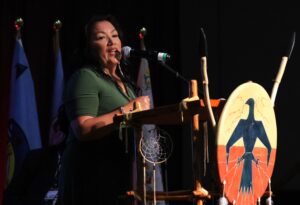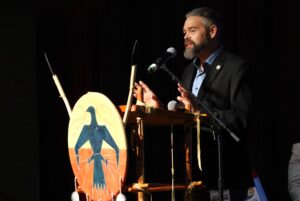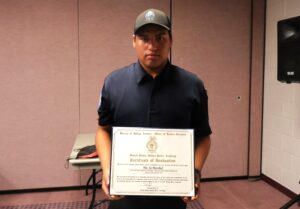Tribes seek youth police academy to fill open jobs
Michael Achterling

Na-Ja Marshall, a junior at Standing Rock Community School, speaks during a breakout session as part of the Tribal Leaders Summit in Bismarck on Sept. 4, 2024. (Michael Achterling/North Dakota Monitor)
Leaders of North Dakota tribal nations advocated this week for a Bureau of Indian Affairs youth police academy at Camp Grafton to help fill open law enforcement positions on tribal lands.
Lonna Jackson-Street, chair of the Spirit Lake Nation, said tribal nations desperately need more police training resources in North Dakota to address workforce shortages.
“We have three officers, and that includes our chief,” Jackson-Street said in an interview during the 27th annual Tribal Leaders Summit in Bismarck. “And we’re pretty close to 450,000 acres.”

The Bureau of Indian Affairs in 2020 opened a U.S. Indian Police Academy Advanced Training Center at the North Dakota National Guard’s Camp Grafton near Devils Lake. It is a complement to the central BIA law enforcement training facility in Artesia, New Mexico.
Jamie Azure, tribal chair for the Turtle Mountain Band of Chippewa, said it costs a lot of money to send tribal members out of state to receive the federal officer training.
“If we can do that locally, and we don’t have to pull people away from their families for long amounts of time because they want to serve our people, that’s the least we can do for our officers,” Azure said.

Participants in the Tribal Leaders Summit advocated for a BIA training academy at Camp Grafton for high school students who are interested in law enforcement careers.
“Obviously funding is always an issue, but I think together, if this is the next step for North Dakota tribes, I think collectively we can come up with some kind of solution,” Jackson-Street said.
Gary Marshall, a member of the Standing Rock Sioux Tribe, facilitated a discussion on a potential BIA youth police academy, highlighting his grandson, Na-Ja Marshall, a junior at Standing Rock Community School who finished his youth academy training in Oklahoma.
Na-Ja Marshall said he hopes to become a K-9 officer with the BIA after he graduates in 2026. He’s taking dual credit classes so he expects to graduate high school with a two-year criminal justice degree as well as his diploma.

Na-Ja Marshall also hopes to inspire some of his classmates to join tribal law enforcement.
“I have been talking to the Standing Rock Community School to get kids interested in joining it,” he said.
In a statement, U.S. Sen. John Hoeven said he helped secure the initial $2.5 million for the BIA training program at Camp Grafton after hearing about law enforcement shortages from tribal leaders.
“We have not yet been contacted by the tribes regarding adding a youth component to the Camp Grafton ATC program,” Hoeven said. “We would be open to working on this and other proposals to continue addressing law enforcement needs in Indian country.”
The BIA director at Camp Grafton did not return a message seeking comment Thursday. A spokesman for the Office of the Assistant Secretary for Indian Affairs did not return emails seeking comment this week.
During a breakout session at the summit, Mac Schneider, U.S. attorney for the District of North Dakota, also highlighted law enforcement workforce shortages on tribal lands.
Only about one-third of the Standing Rock Sioux Tribe’s tribal police force is staffed, he said.
“No one would stand for that if this was a local police force,” Schneider said. “This is a very untenable situation and I wish I could advocate before Congress, but I’d get in trouble if I do that. But I also think if I’m not bringing attention to the lack of law enforcement resources in Indian Country, then I’m not doing my job.”

Schneider said partnerships between BIA, tribal nations and the state of North Dakota could provide some additional law enforcement resources, but those requests must be made by tribal leadership. He said he thinks a youth police academy at Camp Grafton would go a long way to inspiring more young people to pursue careers in law enforcement.
“Anything that gets young people interested in public safety and a career in law enforcement, that’s a good thing,” Schneider said.
South Dakota tribal leaders also have advocated for additional tribal policing courses, reported the South Dakota Searchlight. A new basic law enforcement training course was held this year in Pierre, with a focus on tribal recruits. The effort aims to cut down on expenses for tribal law enforcement and bring newly graduated officers back home to finish their training closer to their communities and families.






